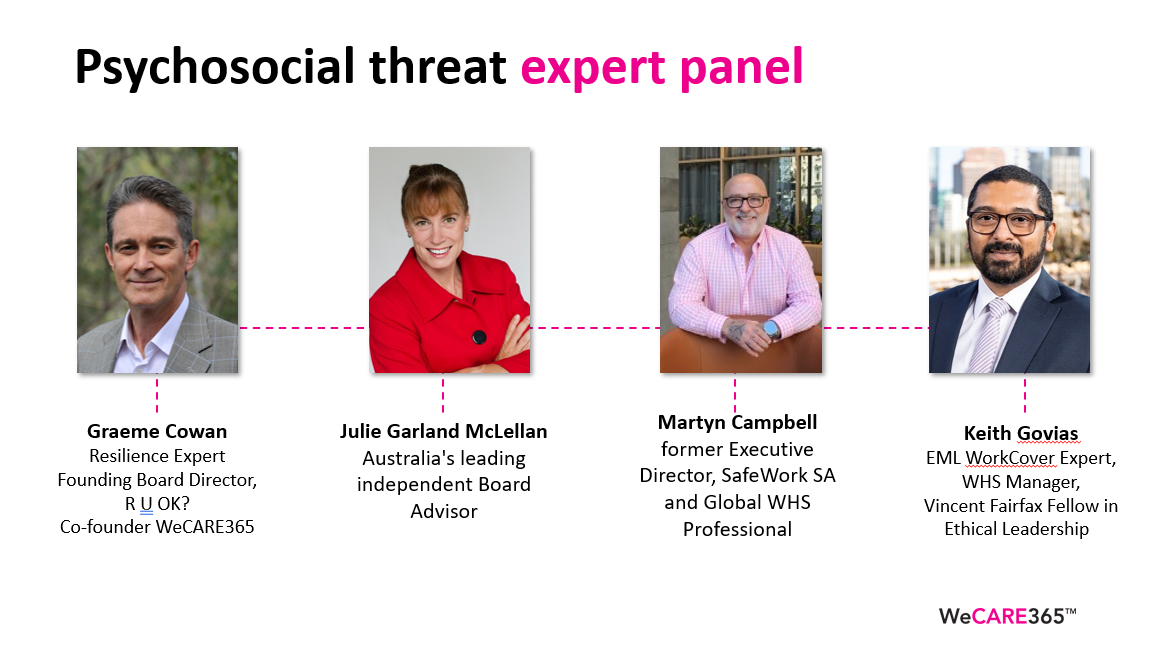The stark reality facing Australian businesses today is undeniable: psychosocial risks have become a critical legal and financial threat that can no longer be ignored. Recent data reveals that one in three employees have experienced a mental health condition lasting more than six months, while the average cost per workers’ compensation claim has nearly doubled from $146,000 to $288,000 in just six years in NSW.
This alarming trend prompted a recent expert panel discussion on how boards and workplace health and safety (WHS) professionals can effectively navigate this complex landscape. The panel, facilitated by Graeme Cowan (co-founder of WeCARE365 and founding board director of R U OK?), brought together leading experts to address the urgent challenges facing organizations across Australia.
Why These Risks Are So Serious?
The financial implications alone are staggering. Psychosocial injuries are three times more costly than physical claims and take four times longer to resolve. Less than 50% of these injuries result in return to work within one year. In response to this crisis, the NSW Government has appointed 99 new psychosocial risk inspectors, signaling a shift toward prevention and proactive intervention.
“The work health and safety laws are about risk management. We measure what we value, and hopefully we value what we measure.” – Martyn Campbell, former Executive Director, SafeWork SA
The consequences of inaction extend far beyond workers’ compensation claims. Organizations face regulatory intervention, prosecutions, and enforceable undertakings that can cost millions of dollars.
The Cobar Mining Case: A Million-Dollar Wake-Up Call
A recent case involving Cobar Management serves as a stark reminder of the potential consequences. What began as two stressed accountants suffering psychological injuries due to excessive workloads, unclear roles, and time zone challenges escalated into a comprehensive regulatory response. After proper assessment revealed systemic issues, Cobar entered an enforceable undertaking with over $1 million in commitments, including comprehensive surveys and psychometric testing.
Cowan emphasized the broader implications: “What’s very interesting about this is that it started off as just 2 stressed accountants. But when they did the proper assessment and looked at processes, it obviously identified a raft of other issues.” This case underscores how seemingly isolated incidents often reveal deeper organizational problems with devastating consequences.
Key Questions and Expert Insights
Making Psychosocial Safety a Measurable KPI
When asked how boards can make psychosocial safety a measurable executive KPI, the experts emphasized the importance of leading rather than lagging indicators.
Julie Garland McLellan, Australia’s leading independent board advisor, stressed the need for curiosity: “One of the things that I would emphasize is the need to be curious for boards to really understand. What are the risks that your people are facing?”
“My KPIs would be more around: How much are we spending on training? How much are we spending on making sure that the staff are supported? You need to understand your business, your people, your workplace, and look for KPIs that make sense for you.” – Julie Garland McLellan, Independent Board Advisor
Keith Govias, WHS Manager at EML, advocated for proactive measures: “Having good conversations with workers about their job, resourcing their job design, and what they need to succeed and thrive is probably a really good starting point.”
Securing Funding for Risk Assessment
Martyn Campbell recommended a three-pronged approach to securing funding: “I attack it from the head, from the heart, from the wallet.” This involves appealing to those who care about workers (heart), providing evidence-based research on business benefits (head), and demonstrating the financial costs of inaction (wallet).
Cowan highlighted a practical tool: “We have on the homepage of our WeCARE365 website a mental ill health calculator. You just put in the number of employees, the average salary, and it uses research to work out what it actually costs in terms of absenteeism, presenteeism, employee turnover, and for many people it’s a very, very large, surprising number.”
Managing Employee Expectations and Complaints
Addressing concerns about employees making complaints when they become aware of psychosocial risks, the experts reframed the issue entirely. As Garland McLellan pointed out: “If your people are actively looking at ways to stuff up your business, you’ve done something very, very wrong.”
“What’s really important for any board member to understand is that it’s a healthy culture when you have people that feel safe enough to report concerns.” – Keith Govias, WHS Manager, EML
Cowan shared a real example: “We had this large multinational client interested in training their managers on all the 14 psychosocial risks. Then they came back and said leadership doesn’t want to do that because people might find out 14 reasons to make claims.” This fear-based thinking, the experts agreed, reflects deeper cultural problems that need addressing.
Top Recommendations to Reduce Financial Threat
When asked for their single most important recommendation to avoid legal and financial threats, each expert offered practical guidance:
Keith Govias recommended embedding one crucial question into every performance review: “What can we do to help you to thrive at work?” This demonstrates consultation obligations while identifying potential hazards early.
Martyn Campbell emphasized getting psychosocial risk “on your risk radar” and urged boards and executives to “listen to your safety team and take their lead.”
Julie Garland McLellan advocated for authenticity: “Get real. Don’t train people because it looks good. Actually do what you say you’re going to do. I’m all about kickboxing, not tick boxing.”
“There’s no physiological difference between fear and excitement. You want people excited coming to work, not fearful.” – Julie Garland McLellan
Graeme Cowan emphasized manager training as defensible evidence: “No matter where you are in the process, I don’t think there’s no harm in training managers how to have prevention conversations. Stevens and Associates, employment lawyers, said training managers with WECARE PsychRisk is defensible evidence if regulators come calling.
PSR Root Causes Across Australia
The experts identified several systemic issues contributing to psychosocial risks:
Poor Management Behaviors: Campbell noted that many issues stem from inadequate training and support for managers at all levels. Cowan reinforced this: “8 out of 10 managers don’t know what to do” to reduce psychosocial risk in their teams.
Job Design Problems: Govias highlighted how role clarity has deteriorated, particularly post-COVID, with many employees unclear about their responsibilities and expectations.
Ignoring the Human Element: Garland McLellan identified the tendency to focus solely on numbers while ignoring people’s wellbeing as a fundamental problem. She cited concerning examples: “Putting the person who made the most profits in the last 3 years, and not noticing that every woman who’d worked for him had left pretty damn quick.”
The Path Forward
The panel’s message was clear: organizations can no longer afford to treat psychosocial risks as a peripheral concern. With regulators increasing enforcement activities and the financial costs continuing to escalate, proactive management isn’t just good practice—it’s essential for organizational survival.
“Managers really matter in this. Do managers know what to do to reduce the risk in their team? 8 out of 10 managers don’t know what to do.” – Graeme Cowan, co-founder WeCARE365
The solution requires genuine commitment from boards and leadership teams, proper training for managers, meaningful consultation with employees, and a culture that values human wellbeing alongside financial performance. As the experts demonstrated, when organizations get this right, they don’t just avoid legal and financial threats—they create thriving workplaces that deliver superior business results.
The choice facing Australian businesses is simple: address psychosocial risks proactively now, or face the potentially devastating consequences later. The time for action is not just now—it’s overdue.
![]()
WeCARE365 is dedicated to creating learning programs that help managers have better mental health conversations focused on prevention and early detection. The programs are practical and jargon free, and designed to turn knowledge into action. Stevens and Associates, employment lawyers, said training managers with WECARE PsychRisk is defensible evidence if regulators come calling.









